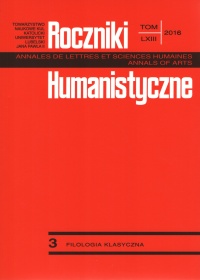Introducing the first topic slot in Plautine dialogues
Abstract
The Plautine dialogues seem to be structured according to the conventions of naturally occurring conversation. This paper examines the transition devices from the (ritualistic) opening phase to the goal-oriented part, where the reason-for-the-talk is disclosed. Firstly, the difference between the phatic preliminary remarks (small talk) and the actual first topic is briefly discussed. Further on, the analysis of the Plautine corpus reveals various ways of making the transition to the medial phase: from multi-turn sequences to single-turn conversational moves. It is stated that the most complex negotiations over the first topic slot placement are a feature of symmetric interactions among high characters with friendly relations. Accordingly, more direct linguistic devices of introducing the reason-for-the-talk appear typically in slave-master dialogues or in aggressive or farcical exchanges between low characters. Some cases, moreover, show that also the wider context of interaction or the dramaturgical factors (depiction of a stock character, progression of the plot etc.) affects the election of the transition style. Finally, throughout the paper some tentative comments are made as well on the politeness issues strictly related to the selection of the linguistic tokens of introducing the first topic slot.
References
Barrios-Lech, Peter. 2014. “Quid Ais and Female Speech in Roman Comedy”. Hermes 142(4): 480–486.
Berger, Łukasz. 2016. Otwarcie dialogowe w komediach Plauta. Poznań: Poznańskie Studia Polonistyczne.
Brown, Penelope and Levinson, Stephen C. 1987. Politeness: Some universals in language usage. Cambridge: Cambridge University Press.
Cheepen, Chrisitine. 2000. “Small talk in service dialogues: The conversational aspects of transactional telephone talk.” In Small talk, edited by J. Coupland, 288–311. Harlow: Longman.
Coulmas, Florian. 1981. “Introduction: Conversational Routine.” In. Conersational Routine. Explorations in Standarized Communication Situations and Prepatterned Speech, edited by Idem, 1–17. The Hague: Walter de Gruyter.
De Melo, Wolfgang (ed.). 2011–2013. Plautus. Comedies. V vols, edited and translated. Cambridge/Massachusetts: Cambridge University Press.
Herman, Vimala. 1995. Dramatic Discourse. Dialogue as Interaction in Plays. London: Routledge 1995.
Hoffmann, Maria E. 1983. “Conversation Openings in the Comedies of Plautus.” In Latin Linguistics and Linguistic Theory, edited by H. Pinkster, 217–226. Amsterdam: J. Benjamins,
Hofmann, Johann B. 1926. Lateinische Umgangssprache, Heidelberg: C. Winter.
Hough, John N. 1945. “The numquid vis formula in Roman comedy.” In The American Journal of Philology 66(3): 282–302.
Kroon, Caroline. 1995. Discourse particles in Latin: a study of nam, enim, autem, vero, and at. Amsterdam: Gieben.
Laver, John. 1981. “Linguistic routines and politeness in greeting and parting.” In Conversational routine, edited by F. Coulmas, 289–304. The Hague: Mouton.
Letessier, Piere. 2000. “La salutation chez Plaute. Adaptation ludique d’un rituel social.” In Lalies 20: 151–163.
Levinson, Stephen, C. 1983. Pragmatics. Cambridge: Cambridge University Press.
Malinowski, Bronisław. 1923. „The Problem of Meaning in Primitive Languages.” In The Meaning of Meaning, edited by Ch. K. Ogden and I. A. Richards, 296–336. London: Kegan Paul.
Moore, Timothy J. 1996. The Theater of Plautus: playing to the audience. Austin: University of Texas Press.
Müller, Roman. 1997. Sprechen und Sprache. Dialoglinguistische Studien zu Terenz. Heidelberg: Universitätsverlag C. Winter.
Poccetti, Paolo. 2010. “Greeting and farewell expressions as evidence for colloquial language: between literary and epigraphical texts.” In Colloquial and Literary Latin, edited by Eleanor Dickey and Anna Chahoud, 100–126. Cambridge: Cambridge Univ. Press.
Roesch, Sophie. 2002. “Les stratégies de clôture du dialogue dans les comédies de Plaute.” In Theory and Description in Latin Linguistics: Selected Papers from the XIth International Colloquium on Latin Linguistics, edited by A.M. Bolkestein et al., 317–332. Amsterdam: Gieben.
Sacks, Harvey. 1975. “Everyone has to lie.” In Sociocultural dimensions of language use, edited by Ben Blount and Mary Sanches, 57–79. New York: Academic Press.
Schegloff, Emanuel A. and Sacks, Harvey. 1973. “Opening up closings.” Semiotica 8(4): 289–327.
Schegloff, Emanuel A. 1968. “Sequencing in Conversational Openings.” American Anthropologist 70(6): 1075–1095.
Schegloff, Emanuel A. 1986. “The routine as achievement.” Human studies 9(2–3): 111–151.
Unceta Gómez, Luis. 2016. “Conceptualization of Linguistic Politeness in Latin: the Emic Perspective”, paper given during the Historical Politeness Symposium, University of East Anglia, June 2016 (in press).
Watts, Richard J. Politeness. Cambridge: Cambridge University Press 2003.
Žegarac, Vlad and Clark, Billy. 1999. “Phatic interpretations and phatic communication”. Journal of Linguistics 35(2): 321–346.
Copyright (c) 2016 Roczniki Humanistyczne

This work is licensed under a Creative Commons Attribution-NonCommercial-NoDerivatives 4.0 International License.





